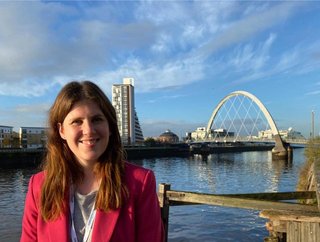Rachel Everard, Rolls Royce, talks Net Zero drive

Everard has been at Rolls-Royce for about nine years now, working in the sustainability team for about six of those and then in her current role for the last three. Her role is Head of Sustainability for the Rolls-Royce Group. She has global remit and responsibility for helping the business to understand what sustainability is and how to respond to increasing pressures – internally and externally – around social, ethical and environmental factors, and really help guide the business and its leadership to make a more sustainable decision. "That's in-line with those increasing expectations, whether that's stakeholder demand regulation or just shifting general mood around various topics," says Everard.
Sustainability caught up with Rachel Everard to find out more
What do you love most about your job?
It is different every day. Everything is different. I also feel like I am contributing to something really positive in the world that potentially could have a small impact or even a really big impact, but either way it feels positive.
Do you see Rolls-Royce’s sustainability team as early entrants in this space?
I think Rolls-Royce has probably been uniquely placed because we've always been motivated to reduce or improve our environmental performance to reduce our greenhouse gas emissions. Historically, that's because, for an airline, all of their operating costs are driven by the cost of fuel. If you can reduce the amount of fuel you need to use in an engine, you reduce their operating costs substantially – about 30% of an airlines’ costs are all on the fuel that they consume. So we've always been driven to pursue those technology improvements, which is almost accidental.
What does sustainability mean to Rolls-Royce?
Sustainability is about balancing the needs of the business with the needs of the system in which we operate. Ultimately, for us, that's about driving to net-zero carbon. We are a business with a relatively large CO2 footprint, just given the nature of the products and services that we've provided that have traditionally been fuelled entirely by fossil fuels. But we're at this really exciting point in that journey where we've made some really bold commitments.
We've said we want to be net-zero carbon by 2050, which, for an organisation of our complexity, size and impact, is a really big deal. We're starting to see the real fruits of that commitment coming through. And there's some really exciting projects that have the potential to scale up and deliver.
Tell us about the relationships you build in order to operate as sustainably as possible.
I think one of the things we're really conscious of is that no one can do it alone in this journey. Particularly for the systems that we are operating within transport, energy and the built environment. Each one is intrinsically linked. We’re an engine provider, so that engine goes onto somebody else's platform – for example, a boat. We provide an engine that goes on someone else's ship, someone else operates that ship, they choose where, which port it starts from, which port it ends up at. You need that whole system to work together because the technology alone doesn't do anything. It can't do anything. It doesn't deliver any benefit to society.
What are the big opportunities for you?
I think there is a fantastic opportunity to come from this. I think Rolls-Royce as a company has a huge role to play in supporting the transition, not just in reducing our own carbon footprint, but actually really helping to accelerate the development of technologies for markets that we're not present in today, whether that's, new ways of connecting people in cities, through air mobility or things like net negative emissions technologies. Direct air capture is something that we're looking into at the moment. But, really taking that step back and thinking about that system level transformation is really exciting.






